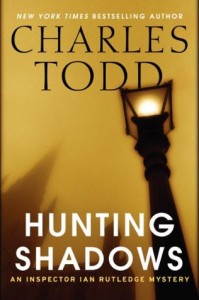 Format read: ebook provided by Edelweiss
Format read: ebook provided by EdelweissFormats available: Hardcover, paperback, ebook, audiobook
Genre: mystery, historical mystery
Series: Inspector Ian Rutledge #16
Length: 336 pages
Publisher: William Morrow
Date Released: January 21, 2014
Purchasing Info: Author’s Website, Publisher’s Website, Goodreads, Amazon, Barnes & Noble, Kobo, Book Depository
A dangerous case with ties leading back to the battlefields of World War I dredges up dark memories for Scotland Yard Inspector Ian Rutledge in Hunting Shadows, a gripping and atmospheric historical mystery set in 1920s England, from acclaimed New York Times bestselling author Charles Todd.
A society wedding at Ely Cathedral in Cambridgeshire becomes a crime scene when a man is murdered. After another body is found, the baffled local constabulary turns to Scotland Yard. Though the second crime had a witness, her description of the killer is so strange its unbelievable.
Despite his experience, Inspector Ian Rutledge has few answers of his own. The victims are so different that there is no rhyme or reason to their deaths. Nothing logically seems to connect them—except the killer. As the investigation widens, a clear suspect emerges. But for Rutledge, the facts still don’t add up, leaving him to question his own judgment.
In going over the details of the case, Rutledge is reminded of a dark episode he witnessed in the war. While the memory could lead him to the truth, it also raises a prickly dilemma. To stop a murderer, will the ethical detective choose to follow the letter—or the spirit—of the law?
My Review:
Hunting Shadows is a fascinating mystery that combines a search for “whodunnit” along with a surprisingly twisty trail leading to “why did they do it”. The struggle in this story is to make sense out of two crimes that seemingly don’t, until they suddenly, and chillingly, do.
This story starts out as a seemingly traditional mystery; we see the crime, but don’t know who the perpetrator is. It looks like the mystery will be the hunt for the killer. But it’s not that simple. He strikes again, and the second victim seems to have no relationship to the first. Except in the mind of whoever shot them both, using the tools and the training of a military sniper.
The combined crimes stump the local constabulary, and Inspector Ian Rutledge is called from Scotland Yard to Cambridgeshire. He arrives and promptly gets lost in both a meteorological and a metaphorical fog.
There are plenty of reasons why someone might want the first victim dead. Captain Hutchinson was a man who did his best to ingratiate himself with the most important people in any room. His problem was that he was just a touch obvious and his charm wore thin on close acquaintance.
It’s even possible to find a motive for the murder of Herbert Smith, the local Tory candidate for Parliament. But there doesn’t seem to be anyone who reasonably, or even unreasonably, wanted them both dead.
Especially not someone with sniper training. That points to a motive left over from the war, and that particular dish of revenge has gone very cold by the time this story takes place in 1920.
Investigation determines that Smith and Hutchinson did not serve together, and they don’t even seem to have known anyone who served with both of them.
But the war and its aftermath are still all too present. Every household lost too many of its young men. Even for those who survived, like Rutledge, the war altered their lives irrevocably. Rutledge manages to successfully investigate murder, sometimes in spite of and sometimes because of the PTSD that he still endures.
In this case, he is under pressure to find the killer quickly. His superiors want a fast result for the murder of a candidate for MP. But when Rutledge finally has a suspect who fits the crimes, he can’t make himself believe that the (relatively) easy solution is the correct one.
His slightly unorthodox methods, combined with intelligence and utterly dogged persistence, finally reach the guilty party.
Escape Rating A-: This series is a marvelous addition to the growing amount of historical fiction and mysteries that cover the World War I and post-war period. For anyone who has fallen in love with this era because of Downton Abbey, the Rutledge series provides a fresh perspective into the post-war life of a much bigger cross-section of people.
Rutledge survived his war, but his shell-shock makes the war an experience that he will carry with him forever. Through him we can see the changes that the war made on the people who served, and through his investigations, the impact on those left behind.
This is a mystery for those who want to see the details of the investigation, but also how the investigator uses his intuition and knowledge to determine the truth. There are no forensic miracles in Rutledge’s 1920, he solves his case with brains and a LOT of legwork.
We follow, and we see everything he sees, both about the case and about life in the Fen country at a time when the old customs were breaking down, but had not yet broken.
Even though Hunting Shadows is the 16th book in this series, it is also a great place to start following Inspector Rutledge’s cases. This is a mystery to savor, and I’m glad there are lots more to read.
~~~~~~GIVEAWAY~~~~~~
The publisher has generously offered 3 hardcover copies of Hunting Shadows in this giveaway! This giveaway is open to the US and Canada. To enter just fill out the Rafflecopter.
a Rafflecopter giveaway
To read an excerpt from the first chapter, check below the fold.
The Fen Country, Cambridgeshire, August 1920
He read the telegram with dismay, and a second time with a heavy sense of loss.
Major Clayton was dead. He’d been in hospital outside London since the closing days of the war, fighting a different battle. Sometimes winning. More often than not losing. They had kept in touch until three months before, when Clayton had been too ill to write, and his sister had been too distressed to write for him.
Dropping the telegram on the table, he gazed out his window. Clayton would be brought back to the Fen country for burial. Services would be held at two o’clock Friday next in the Church of St. Mary’s, Burwell. Only a few miles away.
He intended to be there.
He’d tried hard to put the war behind him. Avoiding weddings and funerals alike, refusing even to deliver the eulogies for men he’d known well. It would bring back too many memories, and he wanted them to stay buried, along with the dead left behind in the torn earth of Flanders Fields. Unable to explain, he’d simply cited ill health as his reason for declining. Burying himself here, he had shut out as much of the rest of the world as he could. He had even stopped reading obituaries. They were too sharp a reminder of the fact that he had survived when so many had not. For the dying had not stopped with the Armistice.
The service for Major Clayton was different. Clayton had saved his life, and in doing so nearly lost his own. The leg had never healed correctly, and in the end it had become the source of the gangrene that overtook first his foot, then his knee, his leg, and finally his body. Dying by inches, he’d called it.
For Major Clayton, he would have to make an exception. He hadn’t been asked by Clayton’s sister to deliver the eulogy, even though he knew the man better than anyone living. And he was just as glad.
Instead the sister had invited a Colonel from London to do that honor. He wondered what Clayton would have made of that, given his feelings for HQ and the generals who had given orders they themselves would never have to carry out. Decisions that sent men to their deaths, maimed them, made them numbers on interminable lists, names and ranks and dates but never the faces or shortened lives that should have reminded the generals that they were dealing in flesh and blood.
Of course St. Mary’s would be full for the service. He reminded himself that he would have to stay well back, where he wouldn’t be noticed.
Only for Clayton, he thought on the Friday as he shaved and then dressed himself with more than his usual care. The Major had been a stickler for appearances; he’d said often enough that if a man respected his uniform, he would respect himself. It would not do to be less than parade perfect even in civilian clothes.
At half past one, he set out for Burwell, planning his journey to arrive shortly before the mourners went inside to take their places. He had no desire to greet anyone, exchange pleasantries or memories. Or to offer condolences to the sister. He barely knew her, and his brief words of sympathy would not lessen her grief.
As it was, by the time he’d reached Burwell and walked on to St. Mary’s by a roundabout way, ending up on the street just above it, the hearse had arrived and only a handful of people were still standing by the west door. He slowed his pace, waiting until everyone else had gone inside ahead of him, and listened to the heavy bell above his head toll the brief years of Clayton’s life. Thirty-five. It was a hell of a thing to die at thirty-five with so much to live for, leg or no leg.
He glanced up at the bell and then back at the church doorway. And there, to his utter astonishment, he saw a face he had never wanted to see again. Much less find one day here in this isolated corner of Cambridgeshire.
He brushed a hand across his eyes, certain that in the bright sun- light he’d been mistaken. That in his distress over the Major’s death, other memories had forced themselves to the forefront of his mind. It would be too cruel—
But no. There he was, bold as brass, smiling and chatting with one of the men in uniform next to him. There could be no mistake.
Captain Hutchinson. What the hell was he doing here? He hadn’t known Clayton, had he? Why was he among the mourners?
Quickly stepping back into the shadows cast by a large tree overhanging the street, he tried to think.
Hutchinson must have traveled up from London with the Colonel. That would explain his being here. Hutchinson was always quick to see an advantage. Or had he somehow discovered that Clayton’s sister was inheriting everything and fixed his eye on her? There was a well-set-up estate in Gloucestershire, and the older property here in Burwell, presently occupied by a tenant. Both would bring in a tidy income.
It would be like Hutchinson, to curry favor before the will had been read, to prove he was no fortune hunter. But he was.
He felt ill, perspiring in the late summer heat like someone with a fever, his legs trembling.
The last of the mourners had stepped inside the church, the coffin had been lifted out of the hearse and shouldered to follow the Rector down the aisle of the nave. And still he stood where he was.
He couldn’t—in God’s name he could not now walk inside. He couldn’t share a roof with Hutchinson. Not even for Major Clayton’s sake. Not with the man who’d killed Mary.
He closed his eyes, trying to steady himself.
A woman’s voice came from just behind him.
“Are you all right, sir?”
“Yes. Yes, I’m fine. Thank you,” he said hoarsely, and in spite of himself, in spite of everything, he started moving toward the church door.
But that was as far as he could go.
Turning on his heel, he walked quickly back toward the shelter of the shadows under the tree. It was as good a vantage point as any from which to keep watch.
Standing there during the service only hardened his resolve. He would be absolutely certain before he left Burwell. It was imperative that he be sure his own emotional state hadn’t made him mistake someone else for Hutchinson. But when the service was over and the mourners began to file out, preceded by the coffin, he saw Hutchinson quite clearly. He was there, a few feet from the Colonel, his hand on Miss Clayton’s elbow as she walked with head bowed, her shoulders shaking with her sobs.
If he had had a weapon of any sort, he’d have used it then and killed the bastard. He could feel the rifle in his hands, the familiar smoothness of the wood, the heat of the barrel from long hours of use, the weight of it, so real to him that for an instant he could almost believe it was there. And with all his heart he wished it was true.
The procession was moving on toward the churchyard.
But just before the procession turned into it, something happened that held him pinned where he was.
Hutchinson lifted his head, like prey scenting the air, and for an instant he was sure that the Captain had stared directly at him.
It was impossible, of course. It was his imagination.
The moment passed, Hutchinson’s back was to him now, and he almost went down on his knees, to vomit.
He stumbled away like a drunkard, away from the church and the churchyard, and somehow, he was never sure afterward just how, he made it to the sanctuary of his house. The first thing he did was to pour himself the stiffest whisky he’d had in five years. The second was to open the wardrobe door and reach far into the back where he knew the Lee-Enfield was hidden.
Drawing it out, he felt on top of the wardrobe for the cartridges. They were still there behind the carved pediment. He wasn’t sup- posed to have brought either the weapon or the ammunition back. But he had, because the rifle had become a part of him. And no one searched his kit.
Thank God he had.
He was already loading the rifle, hurrying to reach Burwell and the churchyard in time.
And then he stopped, reason finally overcoming the strain and emotion that were driving him.
Foolish to do such a thing. First of all, it would mar Major Clay- ton’s last rites. And that would never do. Secondly, he’d be taken up at once and tried and hanged. He would be damned if he’d hang for the likes of Hutchinson.
The man deserved to die. But not this way. Not sacrificing himself.
He removed the cartridges and put the rifle back into the ward- robe, shutting the door firmly.
There had to be a better way.
Look at it from a different perspective. God had brought this man to him once. He would do it again. All he had to do was wait. However long it took.
He began to read the newspapers, as many as he could find. Cambridge, Ely, Burwell, the Times from London. Even the racing news in nearby Newmarket. And he burned them in the grate as soon as he’d finished them, to be certain that once the deed was done, there was nothing lying about that would cause talk or arouse anyone’s suspicion. He traveled as well, to Boston and King’s Lynn, to Bury and Colchester, as far south as St. Albans, looking for anything that might be useful in carrying out his task. He studied people, the way they moved and talked and behaved. It became something of an obsession, the need to survive what he was about to do. There was no satisfaction in it otherwise.
His patience paid off.
Captain Hutchinson was to be a guest at a fashionable wedding to be held in Ely Cathedral in three weeks’ time. His name was there, leaping off the page of the Ely newspaper, even though his was only one of a great many other names. Hutchinson was, it appeared, a cousin to the bridegroom.
The first of September.
He was ready. He’d already laid the groundwork. Now it was just a matter of fitting the plan to the place. Thinking through each step, finding flaws, looking for opportunities on the ground, and looking as well at possible escape routes. He covered the Fen country on his bicycle until he knew every lane and track, until he felt he could reach any point in the dark of night. And then he walked the length and breadth of it.
The Fens were dangerous for the unwary. Narrow flat fields stretched for miles, where a boot in the rich black soil would leave its mark for the hunter to find. Irrigation ditches, sometimes crossed by a road or a bridge over a pump, where a false step could mean falling in and drowning. And the roads themselves, running arrow straight, so that any movement could be seen, even at a great distance. No trees, no buildings to hide behind until the chase had passed. Indeed, nothing to offer cover at all, unless one had learned beforehand where to find it.
He’d thought he’d known the countryside well all his life. Now he knew it intimately.
He was ready.
And Hutchinson would come to him for the killing.








Lady Juila Grey
Sherlock Holmes